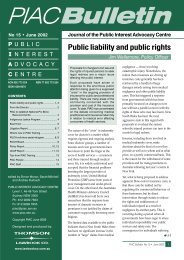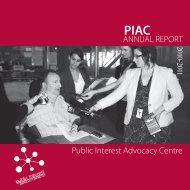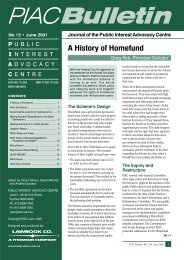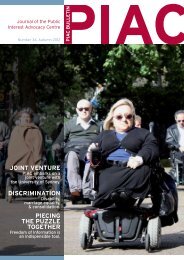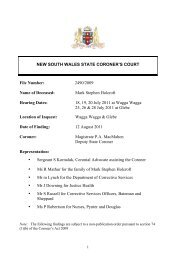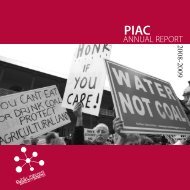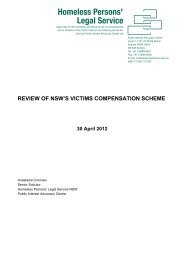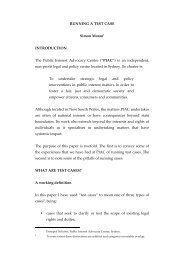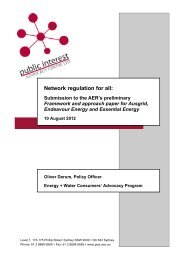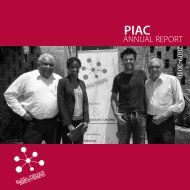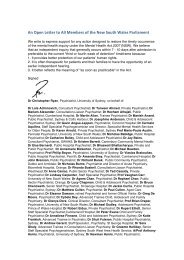PIACBulletin16 - Public Interest Advocacy Centre
PIACBulletin16 - Public Interest Advocacy Centre
PIACBulletin16 - Public Interest Advocacy Centre
You also want an ePaper? Increase the reach of your titles
YUMPU automatically turns print PDFs into web optimized ePapers that Google loves.
operations against the Abu Sayaff<br />
According to Neri, this situation will<br />
inevitably lead to armed conflict in the<br />
Philippines, and US allies in the War on<br />
Terror will inevitably be asked to<br />
support the battle Australia, as an ally,<br />
may thus be dragged into a war that<br />
breaches Filipino sovereignty<br />
The War on Terror thus not only has the<br />
power to kill people, but also the<br />
capacity to destroy societies, says Neri<br />
By pitting nations against each other,<br />
the War on Terror as currently waged<br />
strikes a blow against long-term<br />
international peace And by pitting<br />
citizens within countries against each<br />
other, the War is able to break down the<br />
notion of shared humanity on which the<br />
stability of nations, especially<br />
multicultural nations, relies “Once that<br />
happens, all manner of human rights<br />
abuses are possible, be they official<br />
(such as the internment of citizens as<br />
prisoners of war or ‘suspects’, merely by<br />
virtue of their ethnicity), or otherwise<br />
(such as the sharp rise of vilification of<br />
women who are easily identifiable as<br />
Muslim)”<br />
By defining “aggression”, says Neri, the<br />
Rome signatories may encourage nations<br />
to be “less unrestrained’ in the<br />
declaration of war In that way, the ICC<br />
may be not only be a forum to achieve<br />
justice, but may also become an effective<br />
instrument for peace At the same time,<br />
by virtue of the ICC’s indictment<br />
mechanisms, NGOs campaigning for<br />
international justice have a real<br />
opportunity to play a role in the<br />
prosecution of aggressors before the ICC<br />
So once the appropriate definitions are in<br />
place, those NGOs could offer every<br />
citizen of the world an opportunity to act<br />
as a watchperson in the war on<br />
aggression #<br />
National Pro Bono Workshop launches<br />
new <strong>Centre</strong><br />
Andrea Durbach, PIAC Director and PILCH Co-ordinator<br />
Late last year, the Attorney General,<br />
the Hon Daryl Williams AM QC MP,<br />
announced that PIAC, with national<br />
project partners, had been awarded<br />
the tender to establish a National Pro<br />
Bono Resource <strong>Centre</strong> The National<br />
<strong>Centre</strong>, initially housed at PIAC and<br />
now operating from premises at the<br />
University of New South Wales, was<br />
launched in August at a National<br />
Pro Bono Workshop held in Sydney<br />
In his opening address to the National<br />
Pro Bono Workshop, Professor David<br />
Weisbrot, President of the Australian<br />
Law Reform Commission and Chair of<br />
the National Pro Bono Task Force,<br />
highlighted a key principle which<br />
informed the work of the Task Force:<br />
“that the provision of pro bono services<br />
should be driven by client needs, and not by<br />
what lawyers are prepared to offer …There<br />
is an urgent need to ‘map client needs’ – and<br />
the availability and accessibility of<br />
corresponding legal resources”<br />
This exercise will be a major initial<br />
focus of the new National Pro Bono<br />
Resource <strong>Centre</strong>, launched by the<br />
Attorney General, the Hon Daryl<br />
Williams, at the National Pro Bono<br />
Workshop The establishment of a<br />
National Pro Bono Resource <strong>Centre</strong> was<br />
the “centrepiece” of the Task Force<br />
Report’s Recommended Action Plan<br />
which asserted a national need for a body<br />
that would develop strategies with key<br />
stakeholders to ensure the provision of<br />
targeted, quality pro bono legal services<br />
The Task Force envisaged that the new<br />
centre would seek to achieve these<br />
services by:<br />
• “promoting a culture receptive to pro<br />
bono work;<br />
• improving outreach services and<br />
community education;<br />
• providing tools and training to willing<br />
lawyers;<br />
• providing ‘matchmaking’ opportunities<br />
that will enable skills and resources to<br />
be sent from wherever they are located<br />
to wherever they are most needed;<br />
• removing structural barriers;<br />
• sharing information about successful<br />
programs in Australia and overseas”<br />
Many of these objectives and the legal<br />
needs of rural and remote communities<br />
were discussed during a one-day<br />
intensive forum convened by the <strong>Public</strong><br />
<strong>Interest</strong> Law Clearing House NSW<br />
(PILCH) and PIAC and funded by the<br />
Commonwealth Government<br />
“Overcoming Barriers: A National Workshop<br />
on Pro Bono” brought together 70 people<br />
from across Australia with expertise in the<br />
provision of legal services to explore<br />
opportunities for, and barriers to, pro<br />
bono work The workshop was also<br />
designed to assist the future work of the<br />
National Pro Bono Resource <strong>Centre</strong><br />
Gordon Renouf has been appointed the<br />
inaugural Director of the NPBRC with Jill<br />
Anderson as the <strong>Centre</strong>’s Policy and<br />
Research Officer and Liz Cotter, as<br />
Administrator The NPBRC can be<br />
contacted on 02 93857381 #<br />
6 PIAC Bulletin No 16 • December 2002




